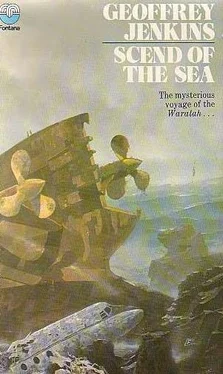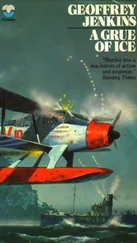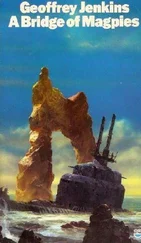Geoffrey Jenkins - Scend of the Sea
Здесь есть возможность читать онлайн «Geoffrey Jenkins - Scend of the Sea» весь текст электронной книги совершенно бесплатно (целиком полную версию без сокращений). В некоторых случаях можно слушать аудио, скачать через торрент в формате fb2 и присутствует краткое содержание. Жанр: Морские приключения, на английском языке. Описание произведения, (предисловие) а так же отзывы посетителей доступны на портале библиотеки ЛибКат.
- Название:Scend of the Sea
- Автор:
- Жанр:
- Год:неизвестен
- ISBN:нет данных
- Рейтинг книги:5 / 5. Голосов: 1
-
Избранное:Добавить в избранное
- Отзывы:
-
Ваша оценка:
- 100
- 1
- 2
- 3
- 4
- 5
Scend of the Sea: краткое содержание, описание и аннотация
Предлагаем к чтению аннотацию, описание, краткое содержание или предисловие (зависит от того, что написал сам автор книги «Scend of the Sea»). Если вы не нашли необходимую информацию о книге — напишите в комментариях, мы постараемся отыскать её.
Scend of the Sea — читать онлайн бесплатно полную книгу (весь текст) целиком
Ниже представлен текст книги, разбитый по страницам. Система сохранения места последней прочитанной страницы, позволяет с удобством читать онлайн бесплатно книгу «Scend of the Sea», без необходимости каждый раз заново искать на чём Вы остановились. Поставьте закладку, и сможете в любой момент перейти на страницу, на которой закончили чтение.
Интервал:
Закладка:
I wiped the blood out of my eyes and swallowed my nausea.
Frantic, I dropped again, slipped, grabbed, from pintle to pintle. Four times more my life hung on a thread above the kicking sea. Then I was in the dinghy, paddling for Touleier.
Jubela stood hanging on to the makeshift stay he had rigged, astonished.
Before I was half-way to him, I shouted, 'An axe! Get me an axe, a crowbar, a boom — anything! Quick! Quick!'
I knelt to the paddle, glancing up only to see my direction.
Jubela clutched the dinghy's grab-lines. He, too did not see it coming. The sea burst over us.
The gale had eased! The sea was rushing back! The 'valley' was filling! The seamount was submerging!
I had a glimpse of Jubela tottering on the deck. Then he was thrown into the welter of foaming water. My back fetched up against something hard. I clutched it fast as the sea fought to tear loose my grip.
Touleier was borne away, half-submerged, in a foam of sea, like a paper boat on a pond.
Five days. Five dawns.
Five days of undetermined merging of day and night.
Five days of gale.
Five crucifying days of agony.
How far I was blown that first day, I have no idea. In the first desperate hours after Touleier was blown away from Waratah's grave — the wild despair burned acceptance into my mind: her grave, too-I fought to get the yacht's head round to go back to her by bringing up the big mainsail from the locker and bending it to assist the rag I had managed to set in place of the jib. The rudder was jammed because the mainboom had crashed on to the self-steering gear, and the — first wild wave fused the two as if they had been welded. I saw the rudder was hopeless. I decided to steer her by sails. The fact that every moment I was being blown further away from her goaded me to a strength I did not know I possessed. There was no sign of Jubela. I presumed he must have been swept away and drowned in that first onrush of returning sea.
Each recalcitrant stay, each intractable sail gasket, each impossible sheet, I fought with a frenzy which ignored the pain of my blood-raw hands as the nails were torn from the sockets of three of my fingers and a thumb. In the end the gale won-that awful, thundering attrition from the south-west which resumed in full blast after the lull. What chance had I, one man, when a crew of race-proven, storm-toughened seamen were needed, against the fury of the gale when trying to break out a bolt of canvas which seemed to have all the devils of the deep lodged in its folds?
I failed.
I wept when the sail blew away into the white, driving gloom of salt and spray. I could not see a boat's-length ahead. I fought for hours after that to try and rig the jib as an emergency, but it, too, was ripped away into the sea-murk. Every time I managed to bring her head round, the yacht would start off in an eccentric circle because of the jammed rudder, until the gale and sea would catch her and throw her bodily to the north-east — away, away, each desperate mile, from the Waratah's grave.
When I realized I could do nothing to handle the yacht, I set about trying to get the radio to work. The rawness of my wounded hands was made worse by spilt acid from the cells, which I refilled and changed, at first with hope, then with despair. The set remained as mute as the hour she had reported it dead.
On the third day, when I ate the last of the emergency sandwiches she had made, and drank the last unpolluted water from the tanks, my frenzy turned to exhaustion, and then to calm-a kind of numb, uncaring calm. My reason told me I was in as almost severe straits as she the moment that steel lid shut on her upturned face; my heart told me it did not matter, and that soon we would be together again.
So I read the pitiful little log between black covers which she took from Douglas Fairlie's pocket and caused her own doom.
I read of the Waratah's doom.
SS. Waratah. 9 p.m.
July 27, 1909
I write this in the presence of Almighty God, to whose protection and mercy I shall go when it is finished, in the certain knowledge that I have only a little time to live. That I am alive, is a miracle, for around me tonight are the bodies of over 200 of my fellow-beings — passengers, captain and officers-in this ill-starred ship. I interpret this small reprieve from death as His grace to enable me, in my extremity, to record how the Waratah met her end.
We sailed from Durban at approx 8 p.m. yesterday. I had the first watch today. I was surprised, before it was fight, to have Captain Ilbery join me on the bridge. He wished me a formal good morning and then stood looking out ahead.
'As an old sailing shipmaster I must sniff the first wind of the day,' he said with an attempt at a smile, but it was clear to me he was very uneasy about something. I had
never known him be like that before.
'What do you make of it?' he asked me.
I was surprised that he did not address me by my rank. He was always meticulous about this, especially in front of the crew.
'Coming up for a south-westerly blow, sir,’ I replied.
Captain Ilbery kept on looking to the south-west, as if he expected to see something there. The sea was rising, and once or twice the ship put her head down. We had had trouble loading 250 tons of coal into the well deck bunker at Durban and we could not get the ship upright. Now I resolved to get the well deck coal below as soon as the day watches came on duty.
Captain Ilbery went to the extreme forward section of the bridge. He seemed to be studying the well deck.
To lighten his unease, I used a windjammer expression as a joke.
'No need to whistle for a wind, is there, sir?'
The Captain did not reply, but started towards the chart-room companionway. Then he said, 'Come below a moment, will you, Douglas?'
I was so startled by his use of my Christian name that I left the bridge and followed him without giving orders.
Again, in the chart-room, he used my Christian name. Even when he had officiated at my wedding aboard Waratah, he had only half-managed to get it out.
'Douglas, what do you make of it?'
The thought crossed my mind, how many great storms has he ridden out, and what is so special about this capful of wind from the south-west?
'It seems to be working up a bit from the south-west, sir,' I replied. There's not much to it at the moment. We had a bit of a blow from the same quarter outward bound round the Cape, you remember …'
‘I don't mean the storm, man-I mean the ship,' he retorted with a vehemence which was so strange from him. The ship and the storm together, if you like.’
'It's not a storm yet, sir,' I pointed out.
'It will come,' asserted Captain Ilbery. 'One develops an instinct, a sixth sense, about these things. It's coming-a big one. This ship has never been in a Cape buster before, Douglas.'
'I'd feel happier if that well deck coal were below for the sake of her stability,' I answered. 'The sea is working up, and she has an odd sort of dead feel to me.'
Captain Ilbery seemed relieved that I shared with him the unspoken fears we both felt about the ship, her stability, and her incredible roll and lurch.
4Do that then,' he said. 'Get it stowed below as soon as you can after daylight.'
'Can I compensate the ballast tanks as well?' I asked. ‘I would like all the weight I can find as deep below her centre of gravity as I can put it.'
Captain Ilbery eyed me gravely, and was about to say something when a messenger came from the bridge. 'Steamer fine on the port bow, sir. Overhauling her.' I went to the bridge, but Captain Dbery stayed. A ship called the Clan Macintyre, bound for London, signalled us. We exchanged formalities. It was off Port St John's.
Читать дальшеИнтервал:
Закладка:
Похожие книги на «Scend of the Sea»
Представляем Вашему вниманию похожие книги на «Scend of the Sea» списком для выбора. Мы отобрали схожую по названию и смыслу литературу в надежде предоставить читателям больше вариантов отыскать новые, интересные, ещё непрочитанные произведения.
Обсуждение, отзывы о книге «Scend of the Sea» и просто собственные мнения читателей. Оставьте ваши комментарии, напишите, что Вы думаете о произведении, его смысле или главных героях. Укажите что конкретно понравилось, а что нет, и почему Вы так считаете.












